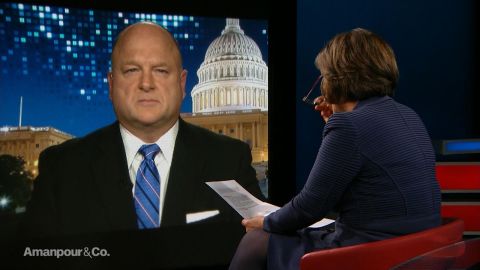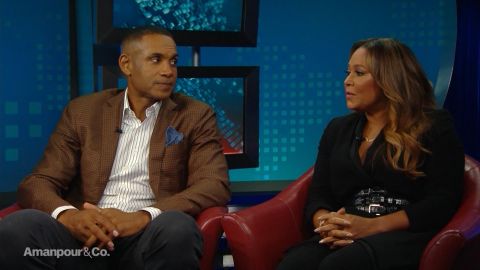Read Transcript EXPAND
CHRISTIANE AMANPOUR: And now, we break away from all of this hard news to talk a little love in basketball and music with our next guests who are the power couple, Tamia and Grant Hill. She is a six-time Grammy nominated singer. He is an NBA Hall of Famer, playing top class basketball for some 20 years. Together, they sat down with our Michel Martin to talk politics, African-American art, and how their 20-year marriage has survived the test of time, injury, and illness.
MICHEL MARTIN: Grant Hill, Tamia Hill, thank you both so much for being with us.
TAMIA HILL R&B SINGER: Thank you for having us.
GRANT HILL, FORMER NBA BASKETBALL PLAYER: Yes. Thanks for having us.
MARTIN: Thank you for coming. Two long careers and both of you in separate fields where often careers are very short, even successful careers are very short, and a long marriage which is difficult for a lot of people who aren’t celebrities. So we’re just hoping that we can learn some things about how to achieve that kind of longevity. I’m looking at all of that and I’m thinking that the theme for me looking at it from the outside is longevity, longevity professionally, longevity sort of personally. Does it feel that way to you?
HILL: I guess there is a longevity element to it. And I think when you have a goal, you have a vision for what you want, and that’s a collective goal and you’re willing to sort of saw wood and work at it every day and adapt and adjust, and then, you know, you kind of lookup for air and you realize, wow, it’s been almost 20 years. And so I think we’re fortunate in that regard but, you know, I think we also can combine that with a level of sort of normalcy in our lives. We enjoy the simple things I think in life, in a relationship, in a family, and our children. Our children’s lives consume us. And so we don’t sort of live this sort of — I don’t know. I don’t feel like we live in this sort of superstar of celebrity fantasy lifestyle. I mean we certainly are fortunate and we are able to do certain things and live a certain way but I do feel like we have a lot of normalcy and a lot of balance in our life which is probably —
HILL: We seek balance.
HILL: Yes. No, we seek — yes.
HILL: The goal is to try to maintain balance.
HILL: Exactly.
MARTIN: Tamia, what about you. What do you — when you look at all that you’ve accomplished individually and together, like does something stand out for you as a theme?
HILL: The first thing that stands out is that time flies, that, you know when you start putting numbers on things like a certain song, so gee, 19 years ago, you know, Grant and I being married, almost celebrating 20 years. We have a 16-year-old, an 11-year-old, you just really realize how time flies.
MARTIN: You both struggle through health challenges so which I think is something important. I think a lot of people know. I mean you started having ankle injuries. They were so severe that you missed an entire season in Orlando fighting through that. And in fact, if I remember correctly, there were doctors telling you that you weren’t going to play again.
HILL: Yes. And I mean this, you know, an entire year you miss a good portion of four years. You know, had a really nasty situation, staph infection. My body was (INAUDIBLE). I almost died. I mean it was a really bad situation and it’s also tough years. You know and for me right sort of at that point professionally where you’re supposed to be in your prime years. And so it was tough mentally, physically, emotionally. That kind of stress and that kind of strain with a young married couple could put a lot of — you know, could either, you know, bring you together or, you know, bring you up or take you apart. And so I think, you know, we just got close.
MARTIN: Do you agree?
HILL: I agree actually. I think that — the same for me. You know, I was going along with my career and seeing — you know, I was having a few little symptoms and kind of we were talking about it and initially getting the diagnosis of M.S. And then —
MARTIN: For people who don’t know, you were diagnosed —
HILL: Yes.
MARTIN: — with multiple sclerosis years ago.
HILL: Yes.
MARTIN: And actually quite public about it.
HILL: I was, yes. Yes.
MARTIN: Why though? I’m curious about that.
HILL: You know I didn’t even think about it. I didn’t even think about it. But, you know, it’s something that I am super grateful for today because I get so many people who have never told anyone that they have M.S. and they say it to me. The first person [13:45:00] in 2018, they still feel sort of a stigma attached with, you know, having some — you know, having a disease like M.S. So, you know, but I think for us dealing with something like, you know, medical issues early on, we stood by each other and we had a little one a little bit after that. And we were in — we were just in go mode. We were in protective mode. That’s how we, you know, we’ve been dealing with issues that we’ve had.
MARTIN: Were you scared?
HILL: Both certainly very scared. We didn’t — I mean I didn’t know what was going to happen.
HILL: Once we found out and learned a little bit about it, and then you learn that there are actually people who have it and have normal lives or deal with it and you surprise a lot of people do have it.
HILL: Yes.
HILL: And so I just thought of like Richard Pryor. I mean I thought just — that was the only example that I knew of, you know. In a weird kind of way as an athlete, you’re kind of conditioned to think we’re always going win because everyone thought I was done. But you always feel like you have a chance.
HILL: You felt the same way with your ankle.
HILL: Oh, no question.
HILL: Regardless of what people said, when they were trying to figure out what was going on, he always felt like —
HILL: Oh, no. And I kept saying I’m going to — I kept saying I’m going to get through this and I’m going to make up for on the back and I’m going to play until I’m 40. And you know what happened? When I got to 40, my body shut down. I should have said 45.
MARTIN: Was that hard for you, you know, to watch him go through that?
HILL: Yes and no. No, because I knew this is something that he wanted, that he was fighting for, and that he had fought for to get back on the court, and he did it. He was actually back on the court playing at a high level which was something that no one knew that you know, that would happen. Yes, that I just saw how hard it was to maintain that level of success on the court, what he put his body through to maintain that level, you know. That kind of was hard to watch.
MARTIN: You’re now working on, about to promote your seventh album on tour.
HILL: Right.
MARTIN: Now, about to go on tour. Is it hard for you watching her?
HILL: The tour, it can be stressful but she’s not going to push herself too far. Like that’s just who she is.
HILL: I think controlling my own calendar like deciding that I was going to put out albums on my own label and controlling my own calendar. So being able to say yes to things and no to things and yes I want to try — I want to tour but this is how I want to do it. That was huge.
HILL: But with Tamia though, I’ll say this, that with M.S., it’s not something you visibly see. And, you know, I have scars on my ankle, a limp, you know. She sees me, you know, physically dealing with whatever I’m dealing with. And so it hurts more how she feels. And so unless she shares that, then you don’t know. And so sometimes, you know — I’m ashamed to say this but sometimes you even forget because things seem normal. You know, she’s active, she’s engaged she’s playing tennis. She’s working now. She’s just continued on. So knowing all of that and being there sort of watching from, you know, from the sidelines, you know, it’s impressive.
HILL: This is the supportive thing that we’re talking about. Like just knowing that you have a partner that supports you and, you know, and sort of your growth, you know.
MARTIN: I want to talk about politics. We’re in a moment in which athletes, as well as artists, are expected to speak about things. They are expected to talk about the issues of the moment. And Grant, you were not known for being particularly political when you were playing. And I wonder if there’s any part of you that regrets that or how do you feel about that now?
HILL: Well, you know, for me, growing up in D.C., more than the redskins or the bullets or the capitals, I always felt like politics was the main sport. And the topic of conversation in our house at dinner was always about what was happening, local politics, national politics. And so when you think of players and athletes and celebrities today versus maybe back in the ’90s when, you know, I was more in my heyday, I think they do speak out more. And I think there are a couple reasons for that. I think, first of all, technology.
MARTIN: Yes.
HILL: You know now you have more access to information. And so, you know, I lived in Detroit and you only really heard which you — or only knew what you heard or read, either in the Detroit News or on T.V. local television. But now, you have the ability to see or read or find out or investigate things that are happening all over the country. And I think social media. I think social media also allows that and allows for you to exchange and share and really get a sense of what’s happening. And I think this generation of young athlete and just [13:50:00] generation, period, they’ve come of age with that.
MARTIN: Well, how do you feel about? I mean you actually have a foot in both worlds. I mean as a former player yourself and now you’re a part owner —
HILL: Right.
MARTIN: — of the Atlanta Hawks.
HILL: Atlanta Hawks.
MARTIN: So you have a foot on both — in both worlds. How do you feel about their outspokenness?
HILL: I love it. I love it. I mean and I love that my partners with the Hawks love it and appreciate it as well.
MARTIN: Do you wish you had been more spoken about politics or about issues when you were playing and you had — you still have a platform but you had that platform?
HILL: Yes. I mean yes and no. I just — it was weird like there wasn’t a lot — like it was just a different time. And so the —
HILL: But you have a platform too. Like now with social media, there’s a direct line of communication.
HILL: You can talk directly to your audience. You know, obviously there’s a lot to put out these days unfortunately but now if something happens, bam, I can post something on Instagram —
HILL: Your own words.
HILL: — on Twitter and I can talk directly to an audience. I can talk to, you know, a couple hundred thousand people and express how I feel. We didn’t necessarily have that luxury back in the ’90s. I’m proud of today’s athletes and those who choose to seek out or stand up and speak out. You don’t necessarily — you’re not obligated to do it. But if you’re going to do it, make sure you’re informed.
MARTIN: So Tamia, you all came up and were able to develop your relationship in relative privacy. I mean you’re both public figures but you didn’t have the glare of social media. Now you’re raising two girls. What are you talking to them about? How are you teaching them to navigate this?
HILL: It’s an everyday sort of conversation. You know we kind of — and social media is sort of evolving as well too, you know. There was Twitter and now Instagram, and Snapchat. I mean these things are, as a parent to try and keep track of all these new sort of apps and ways that they’re communicating with people. I mean when I was younger and someone would call, my mom would pretty much know all of my friends because she’d answer on the phone. “Who are you? How do you know Tamia? What’s going on?” I mean now your kids can have conversations with people that you don’t know. And so we’re just trying to teach them awareness, you know, self-awareness on social media but also teach them that they are loved at home.
MARTIN: Do they know you’re famous?
HILL: Our kids don’t know — they think we’re there show for pretty much. (INAUDIBLE) That’s very much it. And then they’re like, “Yes, I guess she sings. I don’t know. I guess he played basketball but he doesn’t know what he’s doing right now.” Like it’s — our kids are very humbling.
HILL: It’s all about them.
HILL: Yes, yes, yes, yes.
MARTIN: You also have an amazing art collection I’m told.
HILL: We’ve been fortunate to be able to collect and support some amazing artists. And, you know, it’s a genre of art. You know, African-American art has historically been underappreciated like most forms of art if you look, you know, if you look in our sort of history. But yes, I mean I think, you know, my wife’s an artist. I appreciate beauty and artistic expression and we’ve just been fortunate through the years to be able to acquire good pieces and museum quality works, share it with the public. I think the purpose of sharing it was to expose young people, young people of color, but really all people to amazing art by people of color. And so we had a tour. We went to eight different cities. We had it in very well- established museums. The feedback was extremely positive. We made sure that inner-city kids had a chance to field trip and visit the museum. And in some cases, first time these kids ever went to a museum. So hopefully that experience can enrich their lives but also the platform, the celebrity that we bring and that’s attached to it will hopefully introduce people to some amazing art by, you know, African-American artists.
MARTIN: So when people think of the two of you, what do you want them to think about?
HILL: I mean I leave that to you.
HILL: You know, people ask about marriage and how do you do it. And, you know, the other day, we were leaving from an event and we looked at each other like we’re just taking it one day at a time. There’s like zero formula. We have no idea what we’re doing. We’re just doing it together. Like when you have a baby and you’re taking the baby home from the hospital and you’re like, OK, so now what? It’s like you’re just taking it day by day and you’re trying to do your best. And that’s kind of how we are, you know, looking at being together. But also, I think with my career and probably with yours as well, we’re just trying to do our best. I’m trying to put my best foot forward. I’m trying to make sure that whatever I do, I’m doing it with passion and that [13:55:00] I’m proud of the work that I leave behind.
MARTIN: Tamia Hill, Grant Hill, thank you both so much for talking with us.
HILL: Thank you.
HILL: Oh, thank you.
About This Episode EXPAND
Christiane Amanpour speaks with Petro Poroshenko, the Ukranian President; and David Urban, former Senior Adviser for the 2016 Trump Campaign. Michel Martin speaks with Grant Hill, former NBA basketball player and Tamia Hill, R&B singer.
LEARN MORE


